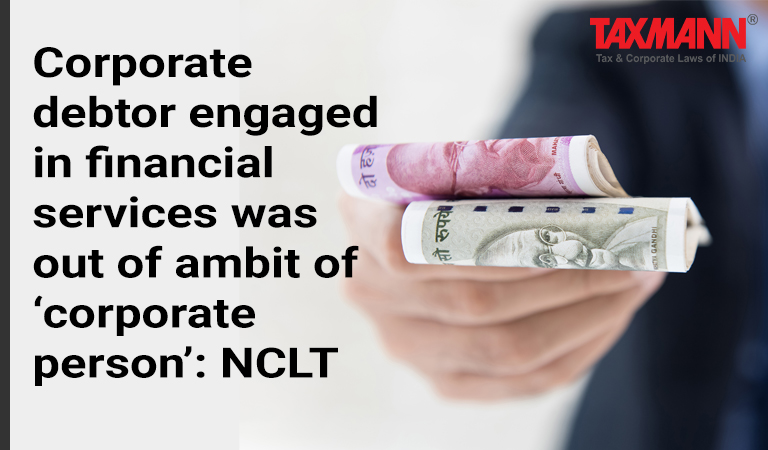Corporate debtor engaged in financial services was out of ambit of ‘corporate person’: NCLT
- Blog|News|Insolvency and Bankruptcy Code|
- 3 Min Read
- By Taxmann
- |
- Last Updated on 3 September, 2022

Case Details: Mrs Parveen Chawla v. MCF Finlease (P.) Ltd. - [2022] 141 taxmann.com 383 (NCLT-New Delhi)
Judiciary and Counsel Details
-
- P.S.N. Prasad, Judicial Member & Rahul Bhatnagar, Technical Member
- Ritesh Singh, Adv. for the Appellant.
- Alok Kumar, Nikhil Malhotra, Manan Gambhir & Ms Garima Soni, Advs. for the Respondent.
Facts of the Case
In the instant case, the present application was filed by the operational creditor – Mrs Parveen Chawla seeking to initiate the CIRP against the corporate debtor – M/s MCF Finlease Pvt. Ltd. for the alleged default on part of the corporate debtor in the clearance of debt towards the financial services.
The operational creditor was the employee of the corporate debtor non-banking financial company and provided its services to the corporate debtor, whose main business was to lend money to borrowers and charge interest on the loan, hire-purchase financing, financing lease, discounting of bills, trading and investing in stock and other aspects of financial business.
The operational creditor alleged that the corporate debtor had not paid her salary and it was also alleged that the corporate debtor had not paid the statutory payments of gratuity for 12 years and had unreasonably withheld the due and payable amount.
Thereafter, the operational creditor issued the demand notice upon the corporate debtor demanding the outstanding amount, which was duly served upon the corporate debtor. However, the corporate debtor neither raised any dispute nor gave any reply to the said demand notice before the statutory period of 10 days.
Then, the appellant filed an instant application seeking to initiate CIRP u/s 9 of the IBC against the corporate debtor, claiming that the corporate debtor defaulted in making payment of an outstanding amount.
However, the corporate debtor claimed that the CIRP could not be initiated against the corporate debtor as it was a non-banking financial company and didn’t fall within the definition of a corporate person. Therefore, the instant application was not maintainable.
NCLT Held
The National Company Law Tribunal (NCLT) observed that section 3(17) of the IBC defines ‘Financial Service Provider’ means a person engaged in the business of providing financial services in terms of authorization issued or registration granted by a financial sector regulator.
Further, the term ‘corporate person’ under section 3(7) of IBC is defined as –
“a company as defined in clause (20) of section 2 of the Companies Act, 2013 (18 of 2013), a limited liability partnership, as defined in clause (n) of sub-section (1) of section 2 of the Limited Liability Partnership Act, 2008 (6 of 2009), or any other person incorporated with limited liability under any law for the time being in force but shall not include any financial service provider”.
The NCLT held that it was clear that a financial service provider is excluded from the definition of “Corporate Person” in terms of section 3(17) of the IBC.
Further, the NCLT held that in the instant case, the corporate debtor was a person engaged in the business of providing financial services in terms of the registration granted to it by the Reserve Bank of India. In view of section 3(7), it didn’t come within the meaning of a corporate person to whom provisions of the Code were applicable.
Therefore, the CIRP application filed against the corporate debtor was not maintainable. Accordingly, the present application was to be dismissed.
List of Cases Reviewed
-
- Randhiraj Thakur v. Jindal Saxena Financial Services (P.) Ltd. [2018] 94 taxmann.com 340 (NCL-AT) (para 11) followed.
List of Cases Referred to
-
- Randhiraj Thakur v. Jindal Saxena Financial Services (P.) Ltd. [2018] 94 taxmann.com 340 (NCL-AT) (para 7)
- Lalit Mishra v. Sharon Bio Medicine [Co. Appeal (AT) (Insolvency) No. 164 of 2018, dated 19-12-2018] (para 8).
Disclaimer: The content/information published on the website is only for general information of the user and shall not be construed as legal advice. While the Taxmann has exercised reasonable efforts to ensure the veracity of information/content published, Taxmann shall be under no liability in any manner whatsoever for incorrect information, if any.

Taxmann Publications has a dedicated in-house Research & Editorial Team. This team consists of a team of Chartered Accountants, Company Secretaries, and Lawyers. This team works under the guidance and supervision of editor-in-chief Mr Rakesh Bhargava.
The Research and Editorial Team is responsible for developing reliable and accurate content for the readers. The team follows the six-sigma approach to achieve the benchmark of zero error in its publications and research platforms. The team ensures that the following publication guidelines are thoroughly followed while developing the content:
- The statutory material is obtained only from the authorized and reliable sources
- All the latest developments in the judicial and legislative fields are covered
- Prepare the analytical write-ups on current, controversial, and important issues to help the readers to understand the concept and its implications
- Every content published by Taxmann is complete, accurate and lucid
- All evidence-based statements are supported with proper reference to Section, Circular No., Notification No. or citations
- The golden rules of grammar, style and consistency are thoroughly followed
- Font and size that’s easy to read and remain consistent across all imprint and digital publications are applied



 CA | CS | CMA
CA | CS | CMA
